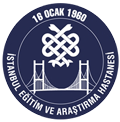ABSTRACT
Introduction
Adding targeted agents to chemotherapy for metastatic colorectal cancer increases survival. There have been no clinical trials in older populations comparing the efficacy of the targeted agents. We aimed to compare the efficacy and tolerability of anti-epidermal growth factor receptor (anti-eGFR) and anti-vascular endotelial growth factor (anti-VEGF) in elderly patients with metastatic colorectal cancer in the first-line setting.
Methods
A total of 89 elderly patients diagnosed with KRAS wild metastatic colorectal cancer who received anti-eGFR or anti-VEGF therapy in the first-line setting were included in the study. Patients received anti-eGFR plus chemotherapy compared with anti-VEGF plus chemotherapy according to general characteristics, response rates, progression-free and overall survival (OS), and non-hematological toxicities.
Results
The median age was 70 (65-81) years old in anti-eGFR group and 69 (65-78) in anti-VEGF group in our study. The progression-free survival was 11 months in the anti-eGFR group and 10 months in anti-VEGF group (p=0.053). OS was not reached at the median of 28 months in the anti-eGFR group and there were no statistically difference (p=0.77).
Conclusion
Progression-free and OS rates were similar between the anti-eGFR and anti-VEGF groups in older patients with metastatic colorectal cancer. Grade 3-4 rash is the most common adverse event in the anti-eGFR group. Pulmoner thromboembolism and diarrhea are the most common adverse events in the anti-VEGF group. Old age is not a barrier for use biological agents.
Introduction
Colon cancer is mostly diagnosed in older people. Nearly 70% of patients diagnosed with colon cancer are over 65 years of age (1). Comorbidities are more common in older patients than in younger individuals (2). The most appropriate therapy for elderly patients diagnosed with metastatic colorectal cancer is not clear because these age group is small among the studies (3).
Cetuximab and panitumumab are monoclonal antibodies that target the epidermal-growth factor receptor (e-GFR) (4, 5). Bevacizumab is a monoclonal antibody that targets vascular endotelial growth factor (VEGF) (6). Previous studies have shown that chemotherapy combined with targeted agents confers a survival benefit compared with chemotherapy alone in older populations (7-9). There have been no clinical trials in older populations comparing the efficacy of the targeted agents. Some previous studies have shown that progression-free survival (PFS) benefit was similar between the older and younger groups (10). However, these targeted agents cause some toxicities like cutaneous reactions and thromboembolic events (11). These adverse reactions sometimes cause treatment discontinuation. Because the elderly patients were mostly frail.
We aimed to compare the efficacy and tolerability of anti-eGFR and anti-VEGF in elderly patients with metastatic colorectal cancer in the first-line setting.
Methods
Patients aged 65 or older who were diagnosed with KRAS wild metastatic colorectal cancer and received first-line chemotherapy combined with anti-eGFR or anti-VEGF therapy in Kayseri City Training and Research Hospital and Erciyes University Faculty of Medicine over the last 15 years were retrospectively reviewed and included in the study. Patients who received therapy for less than 2 months were excluded.
Data collected from the hospital’s patient records included patient characteristics, chemotherapy regimens administered, chemotherapy responses, metastatic sites, number of metastatic sites, and date of death.
Patients received anti-eGFR plus chemotherapy compared with anti-VEGF plus chemotherapy according to general characteristics, response rates, progression-free and overall survival (OS), and non-hematological toxicities.
The present study was approved by the Ethics Committee of Kayseri City Training and Research Hospital (approval number: 758, date: 20.12.2022).
Statistical Analysis
Median, minimum, maximum, and frequencies were defined. The Kaplan-Meier method and log-rank test were used to analyze PFS. PFS was defined as the date from the first targeted therapy combined with chemotherapy until progression or death. OS was defined as the time of chemotherapy and the initiation of targeted agents to the date of death or last known contact. A p-value <0.05 was considered statistically significant. Response was evaluated as complete response (CR), partial response (PR), stable disease (SD), or progressive disease. The Statistical Package for Social Sciences 22.0 (SPSS Inc., Chicago, IL, USA) software was used in all statistical analyses.
Results
Patients and Characteristics
A total of 89 patients diagnosed with KRAS wild metastatic colorectal cancer and who received anti-eGFR or anti-VEGF in the first-line setting were included in the study. Sixty-two (70%) patients were in the anti-eGFR group and 27 (30%) were in the anti-VEGF group.
The median ages were 70 (65-81) years in the anti-eGFR group and 69 (65-78) in the anti-VEGF group in our study. Twenty-two of them (35%) were female, and 40 (65%) were male in the anti-eGFR group. Sixteen of the participants (59%) were female, and 11 (41%) were male in the anti-VEGF group. The primary tumor was right sided in 9 patients (15%) in the anti-eGFR group and in 7 (26%) patients in the VEGF group. All characteristics are shown in Table 1.
Response and Survival
In the anti-eGFR group, an overall response rate was achieved in 53 patients (86%). Three patients had CR (5%), 36 had PR (58%), and 14 (23%) had SD.
In the VEGF group, an overall response rate was achieved in 26 patients (96%). There was no CR. Fifteen patients had PR (55%), 11 patients (41%) had a SD.
The PFS was 11 (5.44-16.55) months in the anti-eGFR group and 10 (9.18-10.82) months in the anti-VEGF group. There were no significant difference (p=0.053). OS was not reached at the median in anti-eGFR group, 28 (22.47-33.52) months in anti-VEGF group and there were no statistically significant differences (p=0.77) (Figure 1).
Toxicity
The most common non-hematological adverse events were rash (18%) and thromboembolism (with 5%) in the anti-eGFR group. Pulmoner thromboembolism is the most common adverse event with 4% in anti-VEGF group (Table 1).
Discussion
In this study, we compared anti-eGFR plus chemotherapy and anti-VEGF plus chemotherapy according to efficacy and tolerability in elderly metastatic KRAS wild metastatic colorectal cancer. We found no significant differences in PFS and OS between the anti-eGFR and anti-VEGF groups. Grade 3-4 toxicities were observed mostly in the rash in the anti-eGFR group, pulmoner embolism in the bevacizumab group, and diarrhea in the anti-VEGF group. Rash was more common in the anti-eGFR group than anti-VEGF group. Pulmoner thromboembolism was similar between the anti-eGFR and anti-VEGF group.
Treatment of older patients with metastatic colorectal cancer remains controversial. Recent studies suggest that treatment toxicitis is more common in elderly individuals, and these individuals are more likely to discontinue treatment (12). The efficacy of chemotherapy is similar in elderly and younger adults (13). The survival of patients who receive chemotherapy combined with biological agents is higher among older patients (7-9).
In our study, we found that the PFS was statistically similar between the anti-eGFR and anti-VEGF groups. In the CALGB/SWOG 80405 study, chemotherapy and cetuximab compared chemotherapy and bevacizumab. They found no significant differences between the PFS and OS. The median PFS was 10.5 months in chemotherapy-cetuximab group and 10.6 months chemotherapy-bevacizumab group (p=0.45). Although our study population comprised elderly individuals, our PFS results were similar to these results. OS was 30 months in the cetuximab and 29 months in the bevacizumab groups in the CALGB/SWOG 80405 study (14). In our study, the median OS was not reached at the median point of 28 months in the anti-eGFR group and the anti-VEGF group. In the CALGB study, the median age was 59. They did not compare survival in older people. The PEAK study compared chemotherapy and panitumumab with chemotherapy and bevacizumab (15). They observed no significant differences between the PFS and OS groups. In this study, the median age was 62 in panitumumab group, sixty in bevacizumab group. In a pooled analyses of four studies, they found 9.3 months for PFS and 17.9 months in patients older than 65 years with metastatic colorectal cancer who received chemotherapy and bevacizumab (10). In this study, in the bevacizumab group, the patients’ median age was higher than ours. The median age was 72 years. Perhaps the higher median age in this study was the reason for the survival difference between them and ours.
In the CALGB study, arterial thrombotic events were not observed higher than 5% in both cetuximab and bevacizumab groups (14). In the PEAK study in panitumumab group grade 3-4 rash was observed in 15% of patients in the panitumumab group and 0% in the bevacizumab group. Deep vein thrombosis was observed in 2% of patients in the panitumumab group and 8% in the bevacizumab group (15). Arterial thromboembolic events were observed in 5.7% of older patients who received bevacizumab (10). In this study, there was no greater difference in non-hematological adverse events between younger and older patients (10). We observed rash in our study in 18% of the patients and pulmoner thromboembolism in 5% of the anti-eGFR group. Pulmoner thromboembolism was 4% in anti-VEGF group in our study.
Study Limitations
This study has several limitations. First, the number of patients was small. Second, we could not identify adverse events in some patients. We only analyzed available toxicities. Third, we could not perform all mutation analyses in our patients due to the retrospective nature of the study. The results that expand RAS, BRAF, and other mutations are valuable. The retrospective nature and small sample size are some of the limitations of our study.
Conclusion
Progression-free and OS rates were similar between the anti-eGFR and anti-VEGF groups in older patients with metastatic colorectal cancer. Grade 3-4 rash is the most common adverse event in the anti-eGFR group. Pulmoner thromboembolism is the most common adverse event in the anti-VEGF group. Old age is not a barrier for use biological agents.



